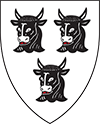Fellows
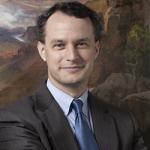 |
Mark MitchellArt GalleryMark D. Mitchell is the Holcombe T. Green Curator of American Paintings and Sculpture at the Yale University Art Gallery. He came to Yale in August 2015 from the Philadelphia Museum of Art, where he organized Audubon to Warhol: The Art of American Still Life and George Inness in Italy. He completed his doctorate at Princeton in 2002 and previously worked at the Princeton University Art Museum, Hood Museum of Art at Dartmouth College, and National Academy Museum in New York. His research interests in American art extend from the colonial period to the later twentieth century in all media, with particular depth in landscape and still life painting.Email Mark Mitchell |
 |
Joan MoninSchool of Public HealthProfessor Monin’s research examines how emotional processes affect health in older adult relationships. Her research combines survey methods and laboratory experiments to understand the mechanisms (e.g. emotional contagion, cardiovascular reactivity) and moderators (gender, individual differences in attachment) involved in these processes. Currently her research focuses on understanding how caregivers and care recipients support one another in late life marriage. Email Joan Monin |
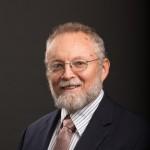 |
Gil MorOb/GynGil Mor, M.D., Ph.D. is a Professor of Obstetrics and Gynecology and Reproductive Science at Yale University School of Medicine. In his research he examines topics related to the immunology of implantation, the role of apoptosis in tissue remodeling and cancer, as well as the role of inflammation in cancer formation and progression. At the present time he is the Division Director of the Reproductive Science Division at the Department of Obstetrics and Gynecology. He directs the Reproductive Immunology Unit and the Translational Research Program “Discovery To Cure” at Yale University. Dr. Mor is the Editor in Chief of the American Journal of Reproductive Immunology. |
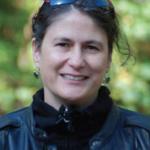 |
Maria MorenoMolecular, Cellular and Developmental BiologyEmail Maria Moreno |
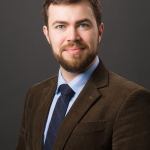 |
John MurrayPsychiatryA Trumbull alumnus, John Murray, Ph.D. is an Assistant Professor of Psychiatry at Yale School of Medicine. He is a graduate of Yale twice over, having received his B.S. In Physics and Mathematics in 2006 and Ph.D. In Physics in 2013. His lab’s research is in theoretical neuroscience, a multidisciplinary field that uses computational and mathematical modeling approaches to study brain function. |
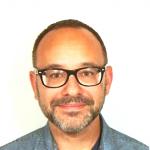 |
Stephen NaronFortunoff ArchivesStephen Naron began his career as an archivist at the Fortunoff Video Archive before moving to Stockholm, Sweden in 2008, where he worked as a translator and academic librarian. He returned to New Haven in 2015 with his wife and two daughters. He received his MSIS from the University of Texas in Austin, a BA in History from the University of Kansas, and has studied at Tel Aviv University, Freie Universitaet Berlin, and the Zentrum fuer Antisemitismusforschung/TU Berlin. Email Stephen Naron |
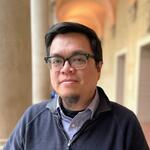 |
Martin NguyenDr. Martin Nguyen is Professor of Islamic Studies at Fairfield University in Fairfield, Connecticut. His work revolves around Muslim theology, ethics, spirituality, Qur’anic studies, and the intersection of race and religion. Among his books is Modern Muslim Theology: Engaging God and the World with Faith and Imagination (2019), which presents a contemporary theology rooted in the religious imagination. Alongside his publications, he is facilitating several scholarly initiatives, including the “Constructive Muslim Thought and Engaged Scholarship” seminar with the American Academy of Religion and the “Islamic Moral Theology in Conversation with Future” project supported by the John Templeton Foundation. More about Prof. Nguyen’s work can be found at here. Email Martin Nguyen |
Kristen NwanyanwuOpthamology and Visual ScienceDr. Kristen Nwanyanwu graduated with highest honors from the University of Michigan. Her degrees in African-American Studies and Biochemistry became the foundation for her career as a health disparities researcher. At the University of Pennsylvania, she earned her medical degree and MBA from the Wharton School. She is a board-certified ophthalmologist and a practicing vitreoretinal surgeon. She completed residency at the University of Michigan and vitreoretinal surgery fellowship at the Illinois Eye and Ear Infirmary at the University of Illinois at Chicago. After joining the Yale faculty, she was selected for the YCCI Junior Faculty Scholars Program through which she completed her Master of Health Science. She is currently the PI for the NIH-funded Sight-Saving Engagement and Evaluation in New Haven (SEEN) Program, a multi-method approach to identifying and addressing health disparities in diabetic retinopathy. She has lectured nationally on health disparities, access to care, and the surgical management of diabetic retinopathy. Email Kristen Nwanyanwu |
|
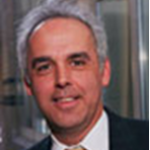 |
Michael O'BrienSchool of MedicineEmail Michael O'Brien |
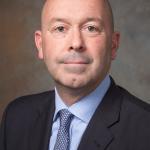 |
Kevin O'ConnorSchool of MedicineDr. Kevin C. O’Connor is an Associate Professor of Neurology at Yale University. He earned a BS in Chemistry from the University of Massachusetts at Amherst and his Ph.D. in Biochemistry at Tufts Medical School. He took his post-doctoral training in Immunology at Harvard where he also spent several years as an Assistant Professor. His investigative interests are in human translational neuroimmunology, with specific focus on defining the mechanisms by which B-cells affect tissue damage in autoimmunity. To this end, his group is engaged in understanding how B-cell subsets initiate and sustain autoimmunity. His team’s accomplishments include refining the role of Epstein-Barr virus in the multiple sclerosis (MS) brain and further defining the role of autoantibodies in children and adults with MS. They recently identified a network of B-cells that populate the MS central nervous system by trafficking through the cervical lymph nodes. Their current efforts include defining the immunopathology of myasthenia gravis (MG). His group demonstrated that MG antigen-specific T-cells belong to the pro-inflammatory Th17 subset and determined that MG patients harbor defects in B-cell tolerance. Their current focus is on describing the mechanisms of autoantibody production in MG, using high-throughput sequencing, toward the aim of improving therapeutic approaches. Email Kevin O'Connor |
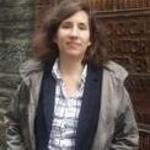 |
Vanessa OgleHistoryI am a historian of global Europe from the 18th century to the present, focusing on the history of capitalism, economic history, and empire in global and comparative perspective. While my particular interests lie in Western Europe (Britain, France, Germany, mostly), I conceive of Europe broadly and seek to place European history in the context of its interactions with the wider world. The sprawling nature of capitalism and the world economy require an engagement with non-European history. Similarly, Europe’s imperial and colonial past beyond the geographic boundaries of the continent is an important part of that history. My first book, The Global Transformation of Time: 1870-1950, explored the history of globalization, tracing changing political, economic, and legal regimes of time during an area of intensified interactions between Europe and other world regions. The book follows time in its different manifestations as social and economic clock time and calendar time from Germany, France, and Britain, to British India, the colonial world broadly, the late Ottoman Levant and Egypt, and the League of Nations. I consider this book a reflection on how to conceptualize the movement of goods, people, and ideas in global and international perspective. I published an article related to the book in The American Historical Review in 2013.
I am currently completing a project titled Archipelago Capitalism: A History of the Offshore World, 1920s-1980s. The book reopens the history of twentieth-century political economy and capitialism (in its free-market, neoliberal variety in particular) in Europe and beyond, by pointing to an economic, legal, and political regime of smaller, often enclave-like territories and spaces that thrived on the sidelines of a world otherwise increasingly dominated by nation-states: tax havens, offshore finance, flags of convenience, and free trade zones. At the same time, the book provides the first archivally-based account of how ‘offshore’ came into existence as a sophisticated, far-flung system often beyond the reach of national regulators and governments. The book thus seeks to shed light on the origins of tax avoidance and evasion on a global scale, one of the most pressing current problems with profound implications for the rise of inequality throughout the twentieth century. The project uses a multi-archival approach that combines documents from over 30 national archives, central banks, multilateral institutions, private banks, and oral history interviews in locations such as Australia, Bahamas, Britain, Canada, Cayman Islands, France, Germany, Guernsey, Ireland, Jersey, Luxembourg, Panama, Singapore, Switzerland, and the US. A pilot article based off this work was published in The American Historical Review in December 2017, another one in Past and Present in 2020.
Email Vanessa Ogle |
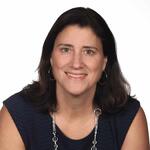 |
Michelle Pagliaro-HaywoodChiropractic PhysicianChiropractic Physician Exercise Strength and Conditioning Specialist Certified Chiropractic Sports Medicine Specialist Adjunct Clinical Professor, University of Bridgeport |
 |
Priya PandaElectrical EngineeringPriya’s research interests lie in Neuromorphic Computing: spanning energy-efficient design methodologies for deep learning networks, novel supervised/unsupervised learning algorithms for spiking neural networks and developing neural architectures for new computing scenarios (such as lifelong learning, generative models, stochastic networks, adversarial attacks etc.). Her goal is to empower energy-aware and energy-efficient machine intelligence through algorithm-hardware co-design while being secure to adversarial scenarios and catering to the resource constraints of Internet of Things (IoT) devices. Email Priya Panda |
 |
Maria Eugenia PaneroSchool of MedicineM. E. Panero is currently the Assistant Director of Academic Affairs with the Interdepartmental Neuroscience Program in the Yale School of Medicine. At seven-years-old, she immigrated from Argentina to the United States with her family, and is especially excited to work with first-generation and Latine students. At Yale since 2018, she previously served as the STEM Program Manager of the Yale Young Global Scholars, as well as a Research Associate in the Yale Center for Emotional Intelligence. She received her Ph.D. in Social Psychology from Boston College, with a Certificate in College Teaching. Her studies explored the psychological effects of entering fictional worlds – through reading fiction, acting on stage, or watching a performance. Having also worked as an actor and singer, she is fascinated by what people gain from and experience when engaging in make-believe. Her research has been federally recognized and featured in major news outlets, such as CNN, Time Magazine, and The Atlantic. In her free time, M. E. enjoys spending time with friends and family, dog sitting, and volunteering at animal shelters. Email Maria Eugenia Panero |
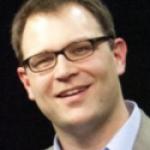 |
Kenneth PankoHigher Education TechnologyHigher education technology leader with a focus on academic innovation and service excellence. Provides vision and strategic direction on the transformative role technology plays in rethinking undergraduate and graduate education for the 21st century. Champions diversity, equity, inclusion, and accessibility. |
 |
Michael PastorDirector of the James Tricarico Jr. Institute for the Business of Law and In-House Counsel; Co-Director of the Innovation Center for Law and Technology; New York Law SchoolMichael Pastor is the Director of the James Tricarico Jr. Institute for the Business of Law and In-House Counsel and Co-Director of the Innovation Center for Law and Technology at New York Law School. He is also a Professor from Practice at the school and faculty advisor to the Latino Law Students Association, the Privacy Law Association, and the Employment and Labor Law Students Association. Pastor previously served as the General Counsel of the New York City Department of Information Technology and Telecommunications (“DoITT”) and the New York City Cyber Command. In those roles, he handled and oversaw all technology law matters for New York City, including those related to cybersecurity and technology procurement. He was also the Deputy Commissioner for Legal Affairs and Franchises at DoITT, where he acted as the City’s lead executive on the City’s relationships with major telecommunications providers, including overseeing the LinkNYC program and initiatives tied to the roll-out of 5G wireless networks in the City. Prior to these roles, Pastor spent nearly ten years in senior roles at the New York City Law Department in the Legal Counsel Division, where he advised on local legislation and regulations, and the Appeals Division, where he argued appeals in State and federal courts in New York. In the latter role, he successfully litigated before the New York Court of Appeals in defense of the City’s land use approvals for the development and modernization of the New York University campus in Greenwich Village. Pastor also served as the First Deputy Criminal Justice Coordinator for New York City in the Office of the Mayor. He began his legal practice as a litigation associate at the international law firm of Morrison & Foerster LLP, after concluding a law clerkship in federal district court in Maryland. Pastor serves on the Board of Directors of the Hudson River Park Trust, Start Small Think Big, and the Judge Alexander Williams Jr. Center for Education, Justice, and Ethics at the University of Maryland. He is a member of the Hispanic National Bar Association, the New York City Bar Association, and the New York State Bar Association, where he serves on the Cybersecurity Subcommittee of the Committee on Technology. Pastor holds a J.D. from New York University School of Law and a B.A. from Yale University. Email Michael Pastor |
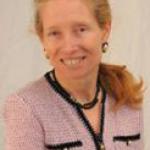 |
Barbara PearceReal Estate/LawBarbara Pearce joined Connecticut Hospice in January 2019 as interim Chief Executive Officer (CEO). Ms. Pearce is currently CEO of Pearce Real Estate and is taking a sabbatical from Pearce Real Estate to devote her time to Connecticut Hospice. She holds JD and MBA degrees, and practiced mergers and acquisitions law before joining Pearce Real Estate, assuming the Presidency in 1986. Ms. Pearce has been actively involved as a community leader in Connecticut and Greater New Haven, chairing many state and local boards, including Hospital of Saint Raphael, CBIA, Long Wharf Theatre; United Way of Greater New Haven; the Community Foundation for Greater New Haven; Artspace; and Saint Martin de Porres Academy. Additionally, she was the founder of the Women Organizing Women Political Action Committee. |
 |
James PerlottoYale College graduate, class of 1978 (Ezra Stiles!), Fellow in Trumbull since 1988, including Resident Fellow/ Executive Fellow 1990 - 1993. Graduate of Boston University School of Medicine 1982, and University of Minnesota residency in Family Medicine and Community Health. After a three year service in the National Health Service Corps, returned to Yale as the Chief of Student Medicine and Athletic Medicine at Yale Health Services for 25 years, overseeing the care of all of Yale’s students. Special areas include GLBTQ health, HIV/ AIDS care , and Sports Medicine. Associate Clinical Professor of Medicine at Yale School of Medicine, and member of the Yale Med Admissions Committee for over 28 years now. Also currently on the Board of Advisers of the Yale Drama School’s Summer Cabaret. Retired from Yale in 2013 but still love being a Fellow of Trumbull. Also teaching college courses and career advising at Stetson University in DeLand, Florida part time. Married to Tom Masse, former Deputy Dean of Yale School of Music and former Associate Provost for the Arts at Yale; and now Dean of the School of Music at Stetson University. We have a lively West Highland White Terrier named “Stella”. Enjoy travel, art history, painting and photography, music, literature and Baseball ! |
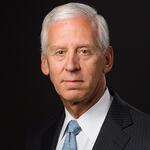 |
John PersingEmeritus SurgeryJohn A. Persing is a doubly Board Certified Plastic Surgeon and Neurological Surgeon. He is passionate about improving the quality of life of children born with craniofacial defects and individuals affected by cancer, trauma, deformities, and aesthetic concerns. He believes that all people deserve a chance at a better life, regardless of economic and world boundaries. Dr. Persing earned his medical degree from the University of Vermont in 1974. He has been President of the Plastic Surgery Foundation, the American Society of Maxillofacial Surgeons, the Association of Academic Chairmen of Plastic Surgery, the American Association of Pediatric Plastic Surgeons, among others, and served as Chair of the American Board of Plastic Surgery. He is past President of the American Association of Plastic Surgeons, and received the Clinician of the Year Award in 2010, as well as the James Barrett Brown award for the best journal article published in Plastic & Reconstructive Surgery in 2015. Dr. Persing has a focus on improving the quality of patients’ lives regardless of whether this is a cosmetic or reconstructive concern. His clinical interests are craniofacial deformities, vascular malformations, and cosmetic surgery of the face and body. Connecticut Magazine named Dr. Persing among the best in the state in its annual “Top Doctors” issue in the 2016 edition, along with America’s Best Doctors (Castle-Connolly) and Who’s Who in Medicine. |
 |
Ruzica PiskacComputer ScienceRuzica Piskac is an assistant professor (tenure-track) at Yale, Computer Science Department. Her research interests span the areas of programming languages, software verification, automated reasoning, and code synthesis. A common thread in Ruzica’s research is improving software reliability and trustworthiness using formal techniques. |

